Test Bank For Adult Health Care 7th edition By Cooper
Chapter 2: Care of the Surgical Patient
MULTIPLE CHOICE
1. The patient who had a nephrectomy yesterday has not used the patient-controlled analgesia (PCA) delivery system but admits to being in pain but fearful of addiction. What is the nurse’s best response?
|
a. |
“Modern analgesic drugs do not cause addiction.” |
|
b. |
“Pain relief is worth a short period of addiction.” |
|
c. |
“Addiction rarely occurs in the brief time postsurgical analgesia is required.” |
|
d. |
“Addiction could be a real concern.” |
ANS: C
Addiction rarely occurs in the short time that it is required after surgery. Postsurgical analgesia, because of its brief application, does not usually produce physical or psychological dependence.
DIF: Cognitive Level: Application REF: Page 34 OBJ: 13
TOP: Fear of addiction KEY: Nursing Process Step: Implementation
MSC: NCLEX: Physiological Integrity
2. A 73-year-old patient with diabetes was admitted for below-the-knee amputation of his right leg. Removal of his right leg is an example of which type of surgery?
|
a. |
Palliative |
|
b. |
Diagnostic |
|
c. |
Reconstructive |
|
d. |
Ablative |
ANS: D
Ablative is a type of surgery where an amputation, excision of any part of the body, or removal of a growth and harmful substance is performed.
DIF:Cognitive Level: ComprehensionREF:Page 16, Table 2-1
OBJ:2TOP:Types of surgeries
KEY: Nursing Process Step: Assessment MSC: NCLEX: Physiological Integrity
3. In which situation might surgery be delayed?
|
a. |
The patient has taken Dilantin today. |
|
b. |
An illegible signature is on the consent form.. |
|
c. |
The patient is still taking anticoagulants. |
|
d. |
The admission office is unable to confirm insurance coverage. |
ANS: C
All medications should be cancelled before surgery, except for drugs such as phenytoin (Dilantin). Anticoagulant therapy increases the threat of hemorrhage and may be a cause for delay.
DIF: Cognitive Level: Knowledge REF: Page 34, Page 36 Table 2-6
OBJ:7TOP:Anticoagulant therapy
KEY: Nursing Process Step: Assessment MSC: NCLEX: Physiological Integrity
4. Which circumstance could prevent the patient from signing his informed consent for a cholecystectomy?
|
a. |
The patient complains of pain radiating to the scapula. |
|
b. |
The patient received an injection of Demerol, 75 mg IM, 1 hour ago. |
|
c. |
The patient is 85 years of age. |
|
d. |
The patient is concerned over his lack of insurance coverage. |
ANS: B
Informed consent should not be obtained if the patient is disoriented and under the influence of sedatives. Age, illegibility, and lack of insurance coverage do not prevent signing the consent. Pain into the scapula is a symptom of colitis.
DIF: Cognitive Level: Application REF: Page 23 OBJ: 7
TOP: Informed consent KEY: Nursing Process Step: Assessment
MSC: NCLEX: Physiological Integrity
5. The nurse anticipates that the patient will be given ______________anesthesia because of the extensive tissue manipulation involved in a hysterectomy.
|
a. |
general |
|
b. |
regional |
|
c. |
specific |
|
d. |
preoperative |
ANS: A
An anesthesiologist gives general anesthetics by IV and inhalation routes through four stages of anesthesia when the procedure requires extensive tissue manipulation.
DIF: Cognitive Level: Knowledge REF: Page 34 OBJ: 9
TOP:AnesthesiaKEY:Nursing Process Step: Assessment
MSC: NCLEX: Physiological Integrity
6. The nurse caring for a patient who had an epidural block for a vaginal repair should be alert for:
|
a. |
a flushing of the face and torso. |
|
b. |
numbness of the perineum. |
|
c. |
complaint of thirst. |
|
d. |
a sudden drop in blood pressure. |
ANS: D
Epidural anesthesia may cause a sudden drop in blood pressure or respiratory difficulty as the anesthetic agent moves up in the spinal cord. Elevating the patient’s torso may prevent respiratory paralysis.
DIF: Cognitive Level: Comprehension REF: Page 37 OBJ: 9
TOP: Epidural block KEY: Nursing Process Step: Assessment
MSC: NCLEX: Physiological Integrity
7. Why might the older adult patient not respond to surgical treatment as well as a younger adult patient?
|
a. |
Poor skin turgor |
|
b. |
Fear of the unknown |
|
c. |
Response to physiological changes |
|
d. |
Decreased peristalsis related to anesthesia |
ANS: C
Of specific concern in older adults is the body’s response to temperature changes, cardiovascular shifts, respiratory needs, and renal function. Fear of the unknown and decreased peristalsis are common to all ages.
DIF: Cognitive Level: Application REF: Page 17 OBJ: 5
TOP: Older adult patients KEY: Nursing Process Step: Planning
MSC: NCLEX: Physiological Integrity
8. The postoperative nursing intervention that would be contraindicated for a 45-year-old patient who has had a repair of a cerebral aneurysm and is presenting signs of increased intracranial pressure (ICP) would be:
|
a. |
coughing every 2 hours. |
|
b. |
turning every 2 hours. |
|
c. |
monitoring intravenous therapy at 50 ml/hr. |
|
d. |
assessing vital signs every 2 hours. |
ANS: A
Coughing increases ICP.
DIF:Cognitive Level: AnalysisREF:Page 28, Box 2-6
OBJ:12TOP:Postoperative complications
KEY:Nursing Process Step: Implementation
MSC: NCLEX: Physiological Integrity
9. The nurse acting as a circulating nurse has a responsibility for:
|
a. |
observing for breaks in sterile technique. |
|
b. |
identifying and handling surgical specimens correctly. |
|
c. |
assisting with surgical draping of the patient. |
|
d. |
maintaining count of sponges, needles, and instruments during surgery. |
ANS: A
The circulating nurse is responsible for observing breaks in sterile technique. The scrub nurse handles the surgical specimens, drapes the patient, and maintains needle and sponge count during surgery, then does a final sponge and needle check with the circulating nurse before closing.
DIF:Cognitive Level: AnalysisREF:Page 43, Box 2-7
OBJ:11TOP:Duties of circulating nurse
KEY: Nursing Process Step: Assessment MSC: NCLEX: Safe, Effective Care Environment
10. Which statement made by a patient during a preoperative assessment would be significant to report to the charge nurse and surgeon?
|
a. |
“I have been taking an herbal product of feverfew for my migraines.” |
|
b. |
“I exercise for 3 hours a day.” |
|
c. |
“I drink 2 glasses of wine a day.” |
|
d. |
“I use atropine eyedrops every day.” |
ANS: A
The herbal remedy of feverfew acts as an anticoagulant and increases the possibility of hemorrhage. The drug should be stopped before surgery, and bleeding and clotting times should be evaluated.
DIF:Cognitive Level: ApplicationREF:Page 21, Table 2-3
OBJ:14TOP:Preoperative assessment
KEY: Nursing Process Step: Assessment MSC: NCLEX: Physiological Integrity

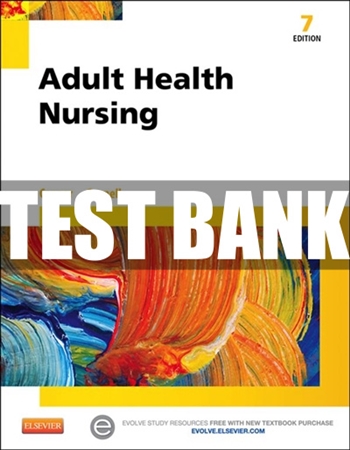
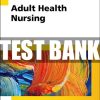
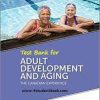
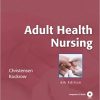
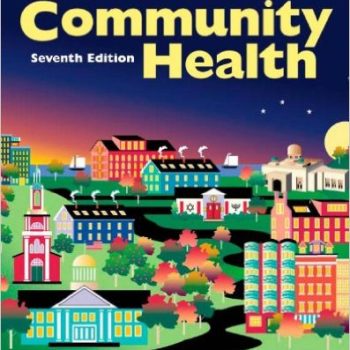

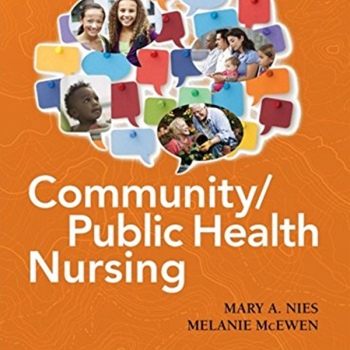
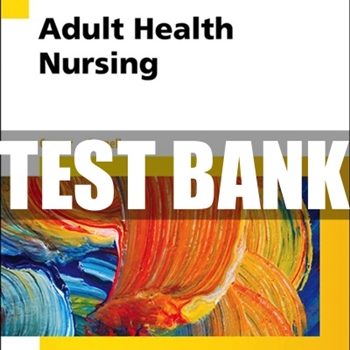
Reviews
There are no reviews yet.